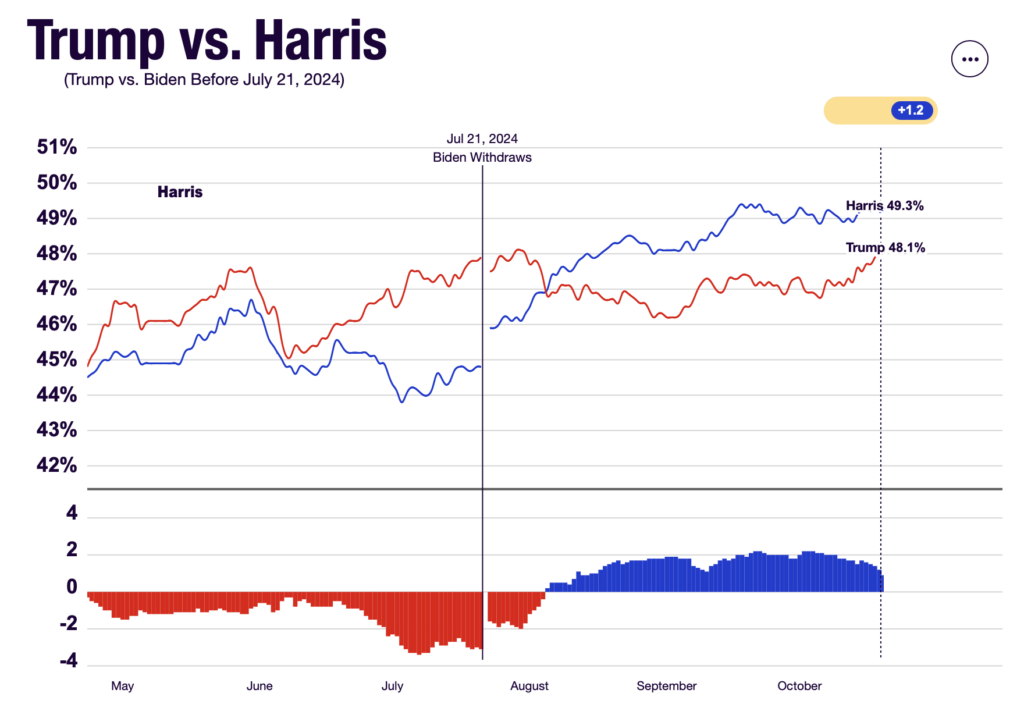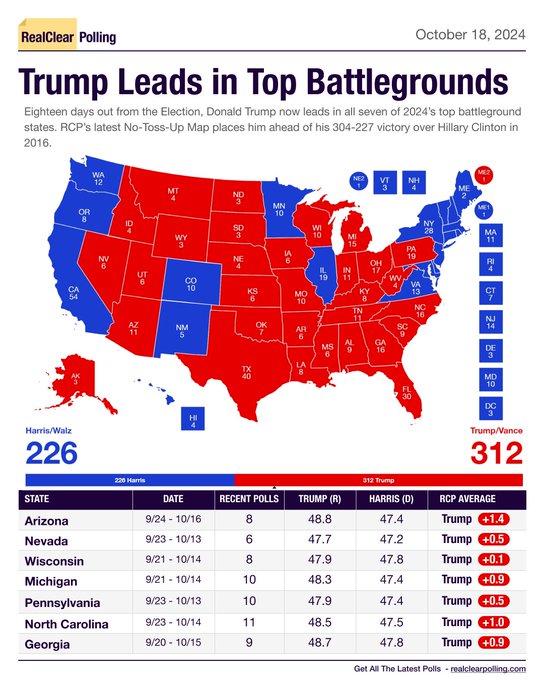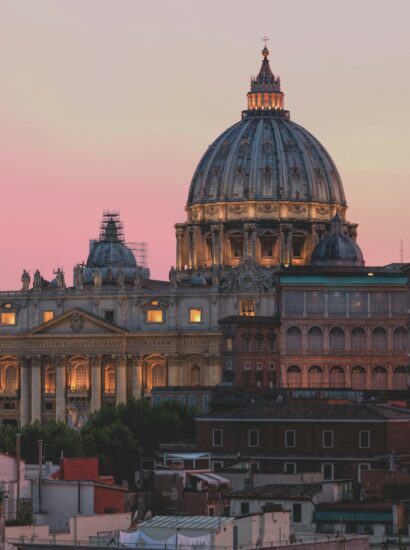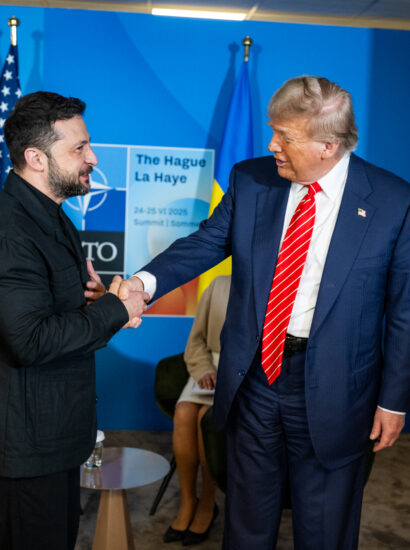There are only two weeks left, and another extremely tight presidential election will have ended in the United States. Last time, we looked closely at how populism and wokeism have captured the country’s bipartisan structure. Now, we sat down with President of the Hungarian Institute for International Affairs and Trade Gladden Pappin, to discuss the other interesting topics of the campaign, like illegal immigration and whether Texas can be a purple state in the near future.
Pappin, a Hungarian-American dual citizen, was born and built his academic career in the United States. He obtained three degrees from Harvard University, including his Bachelor’s degree as well as a PhD in Government. He is also an associate professor (on leave) at the University of Dallas. He co-founded American Affairs in 2017, the most prestigious conservative journal of public policy in the United States, and the Postliberal Order Substack in 2021.
“Hungary is a valuable American ally and a vibrant democracy. The Biden administration’s shadow war against a sovereign nation must stop.” That was a tweet from Senator J.D. Vance a year ago on X when he shared your article about US–Hungarian relations. As many predict, the vice-president nominee can be Donald Trump’s successor even if Trump loses the election. He is also a newly converted Catholic. What do you think about his personality and his faith? Is he a fundamentalist from a religious point of view?
In the U.S. context, fundamentalism has a very strong connotation because it refers to a certain segment of evangelicals who have a very hard theological line. So, it’s a completely different category. If we speak about J.D. Vance, he has a reputation for being a very sincere person. This comes through all his political communication as well, which is very similar to his personal communication. We saw that in the VP debate earlier in the month.
A good example is when his opponent, Governor Tim Walz, said let’s talk about the healthcare situation. And Senator Vance said: “Please, I’d be happy to discuss it.” All in all, Vance’s spiritual quest led him to the Catholic Church, but the main animator of his political ideas is the concern of his country.
J.D. Vance shares Trump’s vision of strength and restraint, refocusing a bit toward Asia and seeking to have more peace deals and less war, particularly in Ukraine.
I think Senator Vance aligns with President Trump’s position, and that is from an American perspective, of course not a Hungarian perspective, but otherwise essentially similar to the Hungarian promotion of peace.
J.D. Vance is often attacked for his comments about immigrants, which are considered to be race-focused. On the other hand, his wife’s parents are Telugu-speaking Indian immigrants. Isn’t that contradictory?
I think his viewpoint is in favour of the law; when he was asked about whether he supports Donald Trump’s plan to deport all illegal immigrants, he responded: first, we have to close the border and gain control of the situation. Second, we have to protect ourselves against criminality, given that more than a million migrants in the U.S. are convicted criminals. J.D. Vance never made some kind of blanket generalizations about all immigrants in America. Legal immigration has always been the nature of the country.
Can we say the United States is an immigrant country?
It’s a heavily immigrant country over a long period of time. Although with an indigenous or native element as well.
What I was going to say is that Indian Americans came to the country legally, especially in the 1990s; there was a very large number of them. Now, I think a very large percentage of technology companies in Silicon Valley are led by Indian Americans. They are a very beloved portion of American life and are not heavily politicized in this aggressive way. So the DEI, diversity equity and inclusion movement is coming from other sectors, and there it’s not even migrants per se, but children of African Americans who had been enslaved in the 19th century.
So, the left wants to make this a systemic issue that is the white majority versus all minorities.
J.D. Vance’s whole persona and his family show that he wants to be oriented toward the good of the whole nation, which includes protecting lawful citizens and lawful immigrants against crime and not favoring illegal immigrants.
To move a little bit to the Democratic party. In my view, the party is in a very large crisis, even if they do not admit it, but there is a strong polarization within the party. The far left has taken control of the party, and the centrists are gone. What will the future of the Party be? And can you see any strong persona in the ranks of the Democrats, like Donald Trump, within the Republicans?
The Harris campaign represents the temporary victory of the Obama and Nancy Pelosy circles of the party. They persuaded President Joe Biden to leave the race. And it’s a different group of people who would come in the Kamala’s administration. I think that group would be made by her; this is uncertain now. But what we can say is that certainly no Democrats entering into the 2024 election wanted or hoped that Kamala Harris would be the leader.
Could it be Gavin Newsom of California, Governor Josh Shapiro of Pennsylvania, Governor Meg Whitmer of Michigan. Maybe there’s someone in the Houses of Congress.
The problem the Democratic Party has, as you said, is that it does have different wings, including a very angry progressive wing that has become radicalized against some of the Democratic Party’s traditional positions.
For example, now there’s a strong anti-Israel segment of the Democratic Party, which is historically unusual because Jewish Americans have always supported the Democratic Party. So, there are problems within the Democratic Coalition. It also includes now some Republicans who left the party after Trump.
I think if Trump wins and Harris loses, you have a very united Republican Party, and the Democratic Party is going to do rapidly some soul-searching.
If Trump is defeated, would it be the same situation for the Republicans?
If Trump loses, there would certainly be a lot of problems in the Republican Party, but I think the future would still be open for J.D.Vance because until now, until this week, he never had a chance, has never had a chance to prove himself on the national stage. Trump brought him onto the national stage. Everyone immediately attacked him. In the VP debate, he had an opportunity to reset his image, and he did so. Therefore, no matter what happens, his future is still open. That would not be the case for Kamala Harris and Tim Waltz.
Anti-Trump Republicans Are Gone
Let’s move on to the Republican Party itself. There is an existent anti-Trump platform. I practically mean the Neocons. Are they as strong as they were 20 years ago?
Yes, they were strong, but now, many of them have left the Republican Party. Even Meghan McCain, the daughter of Senator John McCain, who was a neocon, pointed out on Twitter that J.D Vance absolutely crushed Waltz. And she also said, “Even though I disagree with him politically, I admire his performance.” I think for the base of the Republican Party, what we learned during the primaries this year was that no one other than Trump is acceptable. We saw how Ron DeSantis and Nikki Haley failed against Trump.
It has also been rumored that Nikki Haley can be the future of the Party after the Trump era.
No, I don’t think so. She didn’t reflect an organic expression of interest among Republican voters, but anti-Trump people were promoting her and funding her in order to damage him, basically.
So yes, it’s true that there is, even among the base of the Republican Party, some people who are not perfectly happy with Trump, but by and large, it’s a highly united group.
Trump has changed the way of thinking of the Republican party in Washington to a large extent. Not a hundred percent. There would be a lot of, I think, open areas of discussion, certainly on immigration, on some aspects of the economy. But he united the party on foreign policy: the party has pretty much agreed to prioritize China more, which means it going forward to be a little bit less invested in Europe.
A Harsh Divide between Cities and Towns
How do you characterize a typical Democrat and Republican voter in this election?
America is a big country. It is challenging to describe the ideal on each side, but we can draw a few principal principles. The cities are more likely to be democratic all across the nation. The countryside is much more strongly Republican, even in democratic states.
Thus, we can say in big cities, more people vote for Democrats, while in rural areas, more people support the Republicans.
The interior of the country, the southern part of the country, the southeast and the southwest have become stronger Republican strongholds, whereas the coasts have become very democratic. There is a huge sex difference in this election right now: women are favouring Kamala Harris by about 20 points, and men prefer Trump by about 10 points. But based on the polls, it might have been 24 and 12, but let’s just say it’s about 21.

The poll of the presidential election race (Source: realclearpolling.com)
What about the minorities? How will they cast their votes?
Minorities are more likely to support the Democratic Party for lots of historical reasons and policy reasons, but those numbers have been shifting. So in 2016, Trump got, I think, 26, 27 percent of the Latino vote, but now it’s much closer to 60/40 toward the Democrats or something like that. He’s gained significantly among black voters, particularly black men. So, there are a lot of shifting elements.
Historically, Republicans are more likely to be small business owners, you know, like small-scale property owners, and Democrats are more likely to be the urban people from an urban environment as well as the upper class.
I think today, the archetypal democratic voters, like an angry recent university graduate who’s very ideological and uncertain about their economic future. So, it’s been defended across a lot of categories. Universities are completely democratic. Basically, the elite institutions are more democratic. The archetypal Republican voter is a married couple in the suburbs, just outside of a major town, raising their children, and he owns a small business or network of shops and businesses, a local lawyer, or something like that.
Cultural Issues in the Election, and Texas as a Purple State?
It’s good that you mentioned the angry university students and graduates. Are the pro-Palestinian protests on university campuses – that are very anti-Israel, sometimes anti-Semitic –erupt spontaneously, or are they a result of external powers’ influence, specifically Iran’s?
I wouldn’t speculate on the motives of the principal foreign actors in this case. Rather, I think it’s a mostly organic trend all the time. I saw the change in this between the time I was studying at Harvard over 20 years ago and in the days last year after the October 7 attacks on Israel. A group of 30-something pro-Palestine organizations put out a statement at Harvard, warning against “This shouldn’t be called a terrorist attack” and “Don’t demonize Hamas” or “Israel is a genocidal, occupier state” and so on.
Now, Jewish students at elite universities don’t feel as safe as they used to.
Particularly at Columbia, in New York City, which suffered a huge amount of these pro-Hamas protests. So, the situation has become very radicalized on a lot of elite university campuses.
We currently have seven swing states where it is unclear how the people vote. But there is a republican stronghold, Texas, where in the 2020 election, Joe Biden lost only by just five and a half percentage points. That was closer than Ohio or Florida, which means Texas could be a new purple state within ten years. What do you think about it? Does this result show a trend? Because there are people moving into the big cities like Houston and Dallas from California, these people are probably Democratic voters.
That’s all true, but I think that Texas has defied the predictions that it would become a blue or even purple state. The Democrats don’t have strong politicians in Texas, and the governor of Texas, Greg Abbott, like Ron DeSantis in Florida, has shown himself to be an astute leader of the state.
Furthermore, the Latino communities in Texas, especially from Mexico, have become integrated into American society over time after their immigration in the 1990s. Now, they also don’t want their country to be invaded by illegal migrants from other Latin American countries with which they share little in common.
So, the migration situation that has emerged under the Biden-Harris administration has actually driven many Hispanic districts and taxes further to the right.

The popularity of presidential candidates in the swing states (Source: RealClearPolitics X page )
Do you think there could be a change in the Democratic Party on illegal immigration? It wasn’t that long ago, under Bill Clinton, that the very tough Illegal Immigration Reform and Immigrant Responsibility Act (IIRAIRA) was passed in 1996.
Well, it has become a fundamental part of the democratic strategy to import voters from immigrants in the long run. So, they’re locked into this strategy for a while. Around election time, they always pretend that they’re going to be more conservative on immigration. And Kamala Harris has said, “Oh no, I would have had a much stronger migration policy. It’s because Trump opposed the immigration bill. That’s why we’re having trouble.” No one believes this. We all know that as soon as they take office, if they do take office, their policies at the border will be extremely liberal.
The Role of Elon Musk, possible Interference in the Elections
Earlier, you mentioned that the big tech or the big companies’ CEOs are leaning more toward the Democrats, but there is one famous exception: Elon Musk. What do you think about him and his involvement in the Trump campaign? Is there any possibility that he could have some role in the government if Trump wins?
Well, I think the technology companies overreached in 2020 when they sought to censor the legitimate political speech of President Trump and ordinary Americans online. And so there has been a reaction to that from people like Elon Musk, who until now haven’t been very politicized. Now, he has become more political, but I think still from the standpoint that free speech is good and that democratic systems should be allowed to operate. And he took ownership of Twitter at considerable personal expense and risk and has tried to restore it as a platform for free speech. And so I think for Elon Musk, it’s less about Trump’s particular political plan and more about an overall vision of what a good society consists of, that it would have free speech and have strong industries and be innovative and so forth is not so much of a hard line. I don’t know, of course, but I doubt that Elon has political ambitions. Because I think it would be very difficult to get him out of his companies.
The presidential elections in the U.S. are a very complex and long procedure. Therefore, there is a lot of room for error or interference. Given that, we can assume that the external powers Iran, Russia, and China would like to influence the elections. What is your opinion on that?
I think that, in the case of the U.S., it’s now impossible to find out the truth about the nature of foreign interference. I believe in Hungary, it’s pretty clear, you know, when they’re pushing on one side. But after 2016, when the Democrats had stated that Trump was basically put in office because of Russian foreign interference, most Americans didn’t take this discussion seriously.
Now, it is self-dangerous because it makes it more difficult to identify foreign interference when it is occurring. But it’s hard for me to imagine that those powers really expect to tilt the election one way or the other.
From Europe, the voting process in the United States looks a little bit confusing. Most states have their own rules on how to vote, and there is also a system of mail-in ballots. Some states, like Oregon, make it very easy to register to vote; the Southern states are the opposite. We see a decline in electoral trust in the country, and there was the accusation from the Trump camp that the last election was “rigged by the radical left Democrats.”
As you said, in the United States, each state has a different voting law. There are some federal standards, but there’s a lot of variation by state.
And so many of the problems that occurred in 2020 were due to these differences in states.
Some states allow early voting; some states require identification in order to vote, other states do not require identification, which is very interesting. Some states shifted to these large voting centers away from local places during COVID. So there were a lot of points during the 2020 election where I think people began to lose confidence about the integrity of the elections. I’m not saying that it went too far or changed the outcome of the election, but people need to be confident in the system of their democracy on both sides of the aisle. In 2016, many Democrats denied that the election results were about valid. So it’s no surprise that for years later, the Republicans felt the same way. But I think it’s also helpful that there have been a lot of changes that Republicans sought on the state level in the last few years, so I think Republicans have become more confident in the swing states that there is less likelihood of shady business.
Whoever wins this election race will be an extremely tight race. We already witnessed the violence during the campaign if we just think of the two assassination attempts against Donald Trump. I hope not, but would you imagine that the scenes that we’ve seen on January 6, 2021, can return?
I think the scenes of January 6 won’t occur again. However, as you just said, there have been two assassination attempts on Donald Trump. So, American politics is delicate.
But I think a lot of people on both sides of the aisle were unhappy with the chaos around voting, and we also know that the establishment really wants to stop Trump.
We know that. In spite of that, I also hope there’s enough integrity still remaining in the system that people can be confident in the outcome.







